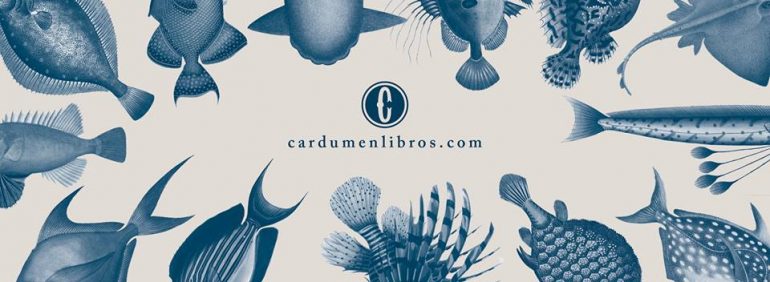Indies Elsewhere: Cardumen Libros

Indies Elsewhere is a series of profiles on small, independent publishers from outside the US.
I first met Alejandra Algorta in a class in our undergrad in Colombia—I was studying communications, and she, literature—that was meant to teach us the business side of having a publishing house or some publishing-related enterprise. Since Alejandra was the only student who had had a book published, she was our resident expert (and constant class example) in contracts. In the class where we were learning how to calculate royalties she was sitting in the back, and all throughout the class I overheard her do math out loud with numbers that made no sense with what was being explained by the teacher. Suddenly I hear her triumphantly inform her friend that according to the royalties she was getting for her book she was able to buy exactly sixteen Domino’s pizzas, which would keep her alive for exactly X number of days (I can’t recall what the amount of slices-per-day variable was). I laughed and turned to my friend, who was also keeping tabs on whatever math Alejandra was performing, and we thought: there is a person who knows what is important in life.
After I graduated I saw Alejandra every once in a while because we more or less worked and studied in the same circles of Colombian independent publishing: I publishing, she writing. But in May of 2015 I received notice of the launch panel for the first book of poetry from her publishing house/imprint: Cardumen Libros—cardumen is the word in Spanish for school of fish. “Los 16 motivos del lobo”—The 16 Motives of the Wolf—is a poetry chapbook where in sixteen fragmented chapters the poet Santiago Guevara tells the story of a violence that seems to have had no beginning and no end; it was illustrated by Amalia Moreno. During the launch, where she talked with Santiago and Amalia, she explained the reason why she started Cardumen Editores. She talked about a conversation she’d had where she realized the difference between what is important and what is urgent. On Cardumen’s website they explain that perhaps the big fish, the large publishing houses, are interested only in publishing what is urgent, what people are talking about now, but Cardumen is interested in publishing what is important. “En nuestro cardumen todos son igualmente urgentes e importantes, necesarios.” “In our cardumen everyone is equally urgent and important, necessary.” Poetry, like the necessary slices of pizza required to live, are, for this project, urgent and important.
To this day Cardumen remains less publishing house and more editorial project. Cardumen works in a similar vein as Tunglið, the Icelandic publishing duo of Dagur Hjartarson and artist Ragnar Helgi Ólafsson. Tunglið works as a mixture of art project and publisher. They produce only small batches of sixty-nine books that are printed on the night of the full moon, and any remaining unsold books are burned that same night. Among the poetic and democratic reasons cited by the duo as to why they burn the books, they mention their wish to help books exist, but at the same time they wanted to be part of their disappearance. To focus all attention on the idea of the book while also radically making it go away before the author, the publishers, the book itself became more important than the content. While Cardumen does not burn their books, and they do strive to get them to as many people as possible, they do share that final disintegration. If and when a project comes along that Alejandra feels strongly about, she will put together a group (a school!) of the people necessary to bring this particular book to life. Authors and illustrators float by, leaving in their wake a beautifully thought-out piece of art, everyone working under the detailed direction of Alejandra.
So far Cardumen has published four books of poetry. The themes go from the memory of a lost love to musings on being a stranger living in a new city. All poetry chapbooks. It is, of course, very hard for her to choose among them one she considers her favorite. In an email interview Alejandra explained to me, “Every book has given me different things, I think that in the process of publishing El Lado Salvaje I found the best friends of my life, so that makes it very special.”
Some are small with hand-sewn spines and hardcover, others are larger and stapled, with illustrations and posters inside. Graphic design is a rather important aspect of these books. Not only a writer and publisher, Alejandra is also an aficionado of graphic design and typography. Sandra Restrepo, a Colombian graphic designer and illustrator, designed the logo. Cardumen has succeeded in creating books that provide as much visual comfort as the poems and stories inside. As Alejandra mentioned, the visual process of inspiration is as curated as the one that goes into selecting the team that will work on the title. “For every project we have a collection of books we use as references, sometimes ten, sometimes three. At the beginning we look at a lot of books, and we realize what adapts itself better to the poems or the artist’s style.” Alejandra quotes projects like Sorry House as inspiration, even if their aesthetic is different from Cardumen.
There is something delicate and luxurious in her books that makes me feel as if I were smuggling treasures whenever I bring Cardumen’s latest launch back home with me to Boston. The most recent title is called Gilliat, and it’s Cardumen’s first foray in translation. The book is an alphabet of definitions written by Victor Hugo for his novel Toilers of the Sea.
Getting books in Spanish, and books in Spanish published by independent publishers, in Boston is hard. It is not much easier to distribute them within Colombia itself. Thankfully, in independent publishing there is a very tight-knit community that has devised its own solutions. An association of independent publishers has come together to create La Diligencia Libros, which works tirelessly in getting as many of the titles into as many regions of the country as possible. Sometimes even to other countries in Latin America.
Making books is a labor of love anywhere, but choosing to publish poetry books in Colombia feels like a particularly foolish venture. In particular after realizing just how much of the money and time is spent in the most offending of all clerical tasks: filing taxes. There are some, few, incentives, as Alejandra explains: “Grants help, that books don’t have to pay taxes helps. But still, it’s very hard. Poetry, nevertheless, is important, either for the construction of something bigger or for personal enjoyment. That is why we have to go on.” And so, Cardumen swims on. While publishing is neither Alejandra’s nor any of her collaborator’s main job, it is the one they continue doing because it is what is important.
